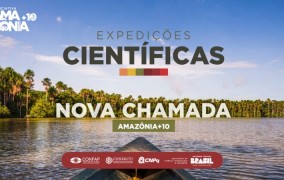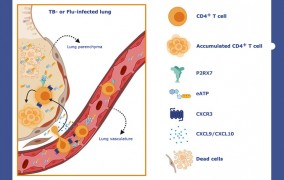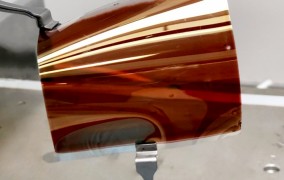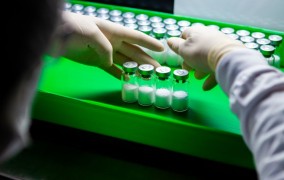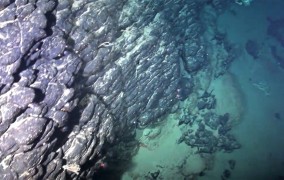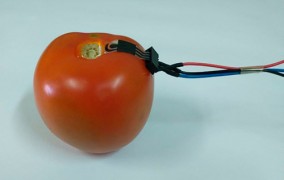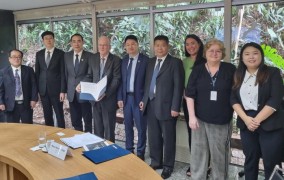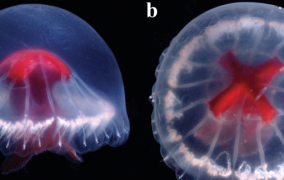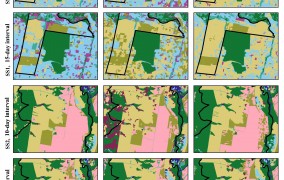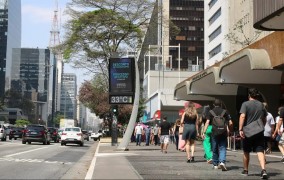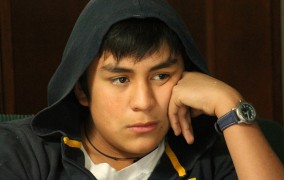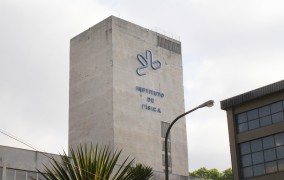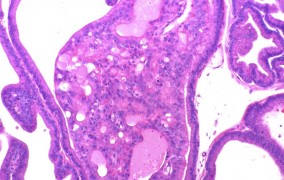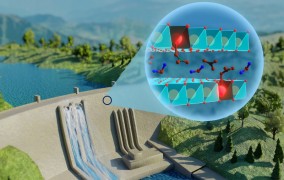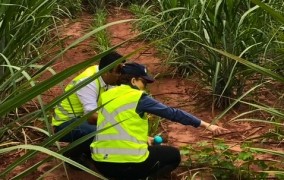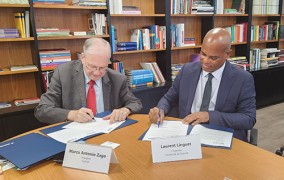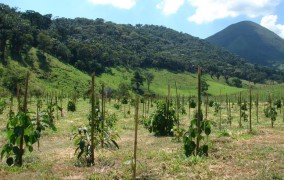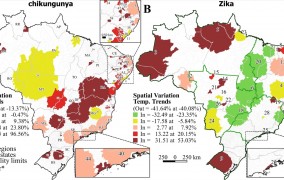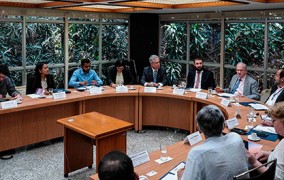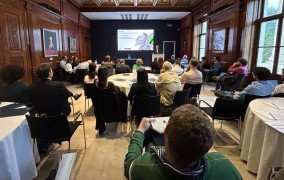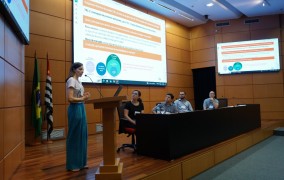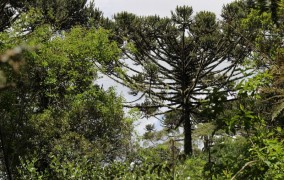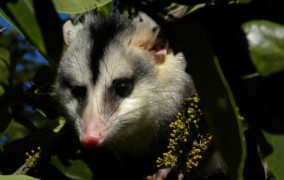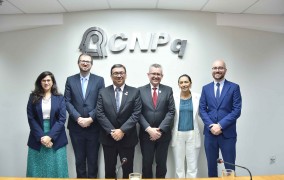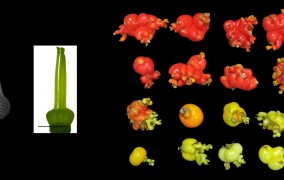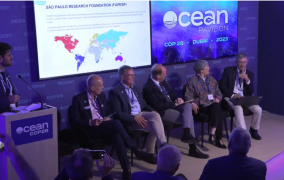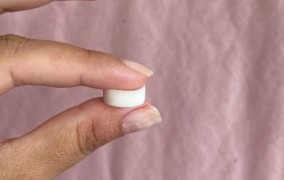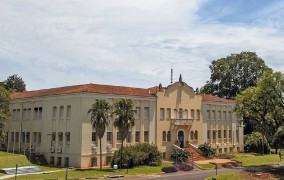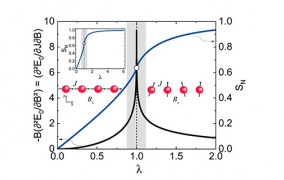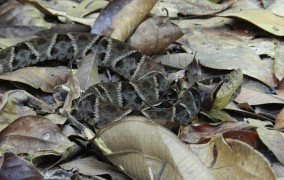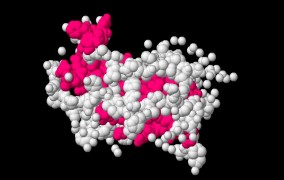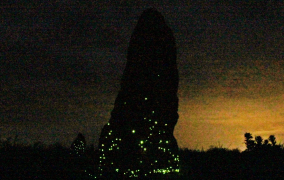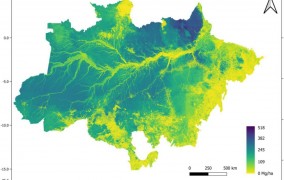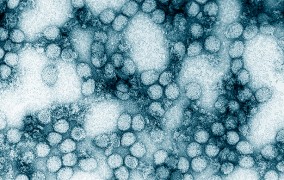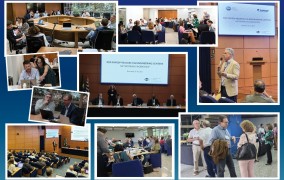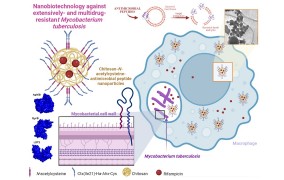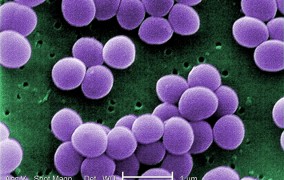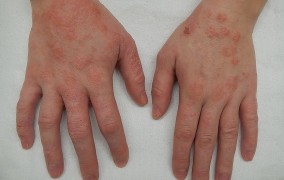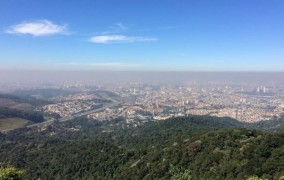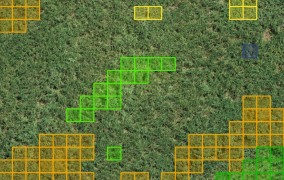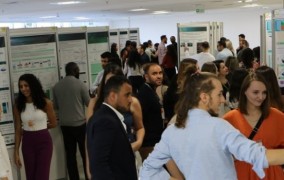
News
-
United Kingdom, Switzerland and Germany join new call for proposals issued by Amazon+10 Initiative
2024-02-07With the new contributions from abroad, the Scientific Expeditions call, issued in partnership with the National Council for Scientific and Technological Development, now has a fund totaling some BRL 94 million. -
Study reveals mechanism that aggravates tuberculosis and reduces survival rates
2024-02-07CD4+ T cells play an important role in the immune response to pulmonary infections, but excessive amounts can damage the lungs. In experiments with mice, researchers at the University of São Paulo discovered what leads to this exacerbated response. -
Startup achieves success with machine that produces thin films from soluble materials with many applications
2024-02-07The startup has been supported by FAPESP since its foundation in 2020. The device can be used to make film for perovskite solar cells, biomaterials for wound dressings and tissue regeneration, and novel drug and cosmetic delivery systems. -
Butantan Institute’s dengue vaccine protects 79.6% of those vaccinated, study shows
2024-02-01Data from the Phase 3 clinical trial was published on February 1st in The New England Journal of Medicine. The vaccine is safe for both participants who have had dengue and those who have never been exposed to the virus before. -
Study shows that Rio Grande Rise was once a giant mineral-rich tropical island near Brazil
2024-01-31This part of the seafloor in the South Atlantic is rich in cobalt, nickel and lithium, as well as tellurium and other rare earths critical to the energy transition. The scientists plan to continue research on its natural processes as a contribution to prospecting efforts. -
Biodegradable sensor monitors levels of pesticides via direct contact with surface of fruit and vegetables
2024-01-31Developed by a team of Brazilian researchers, the device is made of plant-based material with little environmental impact, and detects pesticides in a few minutes, helping to certify food safety. -
FAPESP signs agreement with China-Latin America and Caribbean Technology Transfer Center
2024-01-31The aim is to foster scientific and technological collaboration between researchers affiliated with the Chinese entity and colleagues at universities and research institutions in São Paulo state. -
Brazilian researcher helps describe a novel species of jellyfish discovered in a remote location in Japan
2024-01-31André Morandini, Director of the University of São Paulo’s Center for Marine Biology, was on the team that has published a description of a rare medusa found at a depth of 812 meters. The animal has been sighted only twice in a deep-sea volcanic structure called Sumisu Caldera, in the Ogasawara Islands. -
Method combines artificial intelligence and satellite imagery to map crop-livestock integration systems
2024-01-31The study, which was conducted by Brazilian researchers, supports sustainable agriculture and offers contributions to public policy formulation. -
Cancer: mortality is higher among Black people in Barretos (São Paulo state, Brazil) and among White people in São Paulo city
2024-01-31In 18 cities of the Barretos region, where the proportion of Black people in the population is smaller, cancer kills more members of this ethnic group, whereas in the capital of the same state, it kills more White people, according to a study that compares cancer mortality rates and points to ways of reducing inequalities in diagnosis and treatment. -
System based on Brazilian technology monitors industrial networks
2024-01-31The platform, developed by a company based in São Carlos (São Paulo state, Brazil) and supported by FAPESP, is able to predict and permit correction of failures in order to avoid unplanned factory production line downtime. -
Study helps explain why stress in adolescence can lead to predisposition to mental illness in adulthood
2024-01-24In experiments with rats, researchers at the University of São Paulo analyzed brain tissue and detected alterations in genes associated with energy metabolism. -
Applications are open for the São Paulo School of Advanced Science on Quantum Materials
2024-01-24The event will take place on July 16-26 at the University of São Paulo’s Physics Institute, for 100 graduate students and/or young researchers, half from Brazil and half from other countries. -
Study explains why protein-poor diet during pregnancy increases risk of prostate cancer in offspring
2024-01-24In experiments with rats, researchers at São Paulo State University detected changes in the expression of more than 700 genes in offspring. One of these genes is known to be associated with prostate cancer. -
Novel material facilitates measurement of concrete deterioration in buildings and other structures
2024-01-24The material is a compound similar to clay and enables inspectors to carry out in-situ assessment of structural conditions in buildings, bridges, dams and other structures without having to drill for samples and analyze them in a laboratory. -
Computational tool processes data to produce predictive analysis for agribusiness
2024-01-24The solution, which was developed via a project supported by FAPESP, aims to help farmers assess risks and forecast future prices. -
FAPESP signs scientific and technological cooperation agreement with University of French Guiana
2024-01-24The two parties are interested in collaborative research on sustainable use of biodiversity in the Amazon, prevention of transmissible and chronic diseases, and sustainable construction, among other subjects. -
Study of gigantism in whales provides clues to genomic mechanism involved in tumor suppression
2024-01-22Some species of cetacean are up to 4 meters in length, while others reach 30 meters. According to researchers at the State University of Campinas, genes that favor the colossal growth of these mammals also inhibit the development of cancer. -
Novel methodology projects growth of native trees, enhancing return on investment in forest restoration
2024-01-17The study analyzed data for 13 Atlantic Rainforest restoration areas involving ten species of native trees that could be commercially useful to the timber industry. Publication of the findings comes during the UN Decade on Ecosystem Restoration. -
Cases of chikungunya and zika fall in Brazil, but most risk clusters exhibit an upward trend
2024-01-17Researchers at the University of São Paulo and São Paulo state’s Center for Epidemiological Surveillance observed spatial and temporal patterns of occurrence and co-occurrence for the two arboviral diseases in all Brazilian municipalities, alongside the influence of environmental and socio-economic factors. -
ASEAN delegation meets with senior executives of FAPESP to discuss ways of intensifying research and innovation partnerships
2024-01-17Indonesia, Malaysia, Philippines, Singapore Thailand and Vietnam have dynamic economies and similarities with Brazil that make collaboration particularly relevant. -
A single session of aerobic exercise improves blood pressure in rheumatoid arthritis patients
2024-01-17A study involving 20 women with rheumatoid arthritis and high blood pressure demonstrates the benefits of walking at moderate speed for 30 minutes even after tests that simulate stressful situations and tend to raise blood pressure. -
Study identifies priority areas for conservation of endangered crustacean in Brazil
2024-01-17The land crab Johngarthia lagostoma occurs only on four ocean islands, three of which are in Brazil, but little is known of its natural history. Brazilian researchers discovered that a hill and beach on Trindade Island play a key role in the species’ reproductive cycle and survival. -
FAPESP and UK’s Royal Society hold bilateral meeting in London
2024-01-17The purpose of the event was to build ties and foster collaboration between researchers in São Paulo state and the United Kingdom. -
Startups present results of projects conducted under aegis of Centelha SP program
2024-01-17Representatives of 44 startups based in São Paulo received technical support for a year to develop products and business plans via in-person training, mentoring and workshops run by experts from FAPESP and associations that foster entrepreneurship. -
More than 80% of tree species endemic to the Atlantic Rainforest are threatened with extinction
2024-01-15A study published in the journal Science shows for the first time the degree of threat to all tree species in the biome, classifying 65% as vulnerable or endangered to some extent. According to the authors, their findings are conservative – the actual situation could be even more alarming. -
Climate change: Brazilian semi-arid biome could lose over 90% of mammal species by 2060
2024-01-10Even under the best-case scenario, mathematical models suggest 87% of mammals will be left without a habitat in the Caatinga within three and a half decades. The loss will be worst in the eastern portion of the biome, where its main cities are located. -
Amazon+10 Initiative receives more than BRL 30 million from the United Kingdom
2024-01-10The funding will be for scientific expeditions under the current call for proposals which is taking applications until April 29, 2024. -
Study reveals key molecular mechanisms involved in development of tomato plant
2024-01-10Research conducted at the University of São Paulo shows how interaction between plant hormone gibberellin and small RNA molecules enables development of ovaries, followed by fruit and seeds. This knowledge serves as a basis for ways to increase tomato yield. -
Applications open for School of Advanced Science on Technology and Innovation Strategies and Policies for Economic Development
2024-01-10The school will provide a set of intensive courses for postgraduate students and early-career researchers on the recent developments in the economics of technological change and in ST&I policy studies. Registrations are due on January 26, 2024. -
Climate intelligence platform supports decision-making by farmers and agroindustry
2024-01-10Agrosmart, a startup based in São Paulo state, presented its portfolio of solutions during COP28, the UN Climate Change Conference held in Dubai. -
FAPESP at COP28 reinforces coalition to create new international body to protect the oceans
2024-01-10The International Panel for Ocean Sustainability (IPOS) will translate scientific information into policymaking decisions that help protect the world’s oceans. -
Intravaginal sponge can make treatment of candidiasis more comfortable and effective
2024-01-08The device is under preclinical trials; the sponge is made of soft, biodegradable material and releases medication slowly into the organism. -
Brazilian researchers discover two novel peptides with biotechnological potential in snake venom
2024-01-03Fragments of hemorrhagic toxins that may help treat high blood pressure were found in the venom of the pit viper Cotiara, which inhabits the South of Brazil, and that of the South American bushmaster, a denizen of tropical rainforests. The molecules might one day be used in drugs with fewer adverse side effects. -
Startup develops rapid test to help detect cervical cancer
2024-01-03The kit is designed to be used for screening. If the result is negative, it should be repeated a year later. If positive, the individual should see a specialist. -
São Paulo School of Advanced Science in Precision Livestock Farming accepts applications until January 20
2024-01-03The main aim is to optimize farm management via real-time control of animal productivity and environmental impacts, among other things. -
Researchers at São Paulo State University propose conditions for maximizing quantum entanglement
2024-01-03Entanglement is a key concept in quantum physics and a condition for the success of quantum computing. -
Incomplete notification and underreporting of snakebites can hinder public health actions, study suggests
2024-01-03A survey conducted in a Brazilian state with the country’s second-highest number of ophidic accidents draws attention to the need to train health workers to complete notification forms correctly. Better data will help improve research and antivenom distribution. -
Growth hormone influences regulation of anxiety via a specific group of neurons
2024-01-02Researchers at the University of São Paulo identified in mice the neurons associated with the anxiolytic effect of growth hormone. Their discovery paves the way for the development of novel classes of medications for neuropsychiatric disorders. -
Diversity of bioluminescent beetles in Brazilian savanna has declined sharply in 30 years
2024-01-02Surveys conducted in the Cerrado since the 1990s show falling biodiversity as the agricultural frontier advances in the vicinity of Emas National Park. Species with biotechnological potential are dwindling and even disappearing. -
A new map showing all above-ground biomass in the Brazilian Amazon
2023-12-20The map is derived from a study conducted by researchers at Brazil’s space research institute and collaborators, and combined airborne laser scanning, satellite imagery and forest inventories. The results will support planning, conservation and sustainable management decisions. -
3D material found to break down antidepressant that contaminates water bodies worldwide
2023-12-20Brazilian researchers tested a photocatalyst based on zinc oxide and found it to perform well in degrading sertraline, an emerging pollutant. -
Brazilian researchers report detailed analysis of heart injury caused by yellow fever virus
2023-12-20The study is the first-ever demonstration of the anatomical substrate for the cardiac arrhythmias that occur in human yellow fever. -
Workshop assembles researchers affiliated with centers supported by FAPESP and United States’ NSF
2023-12-20The event took place in São Paulo on November 29-30 to foster interaction and promote center-to-center relations. -
Nanoparticles with antibacterial action shorten duration of tuberculosis treatment
2023-12-20Researchers at São Paulo State University tested the action of nanoparticles loaded with antibiotics and other antimicrobial compounds on cells infected by the bacillus that causes tuberculosis. The results suggest the strategy can overcome multidrug bacterial resistance. -
Photodynamic action weakens resistance to antibiotics in bacteria that attack airways
2023-12-18A study conducted at the University of São Paulo’s Optics and Photonics Research Center in Brazil showed a change in the bacterium’s sensitivity after five applications. -
Gut-skin connection is key factor in atopic dermatitis, research review shows
2023-12-18A review article by Brazilian researchers lists recent discoveries on this chronic inflammatory skin disease, which affects around 10% of adults and 25% of children. -
Atmospheric pollutants in São Paulo exceeded recommended levels even at the height of the pandemic
2023-12-18Brazilian researchers analyzed air pollution in metropolitan São Paulo in 2019-20 when mobility restrictions and social distancing applied in the southern hemisphere’s largest city. Even so, the daily average exceeded the World Health Organization’s air quality standard on 75 days. -
Artificial intelligence applied to drone imagery helps improve agricultural productivity
2023-12-13A Brazilian startup’s AI algorithms detect infestations, classify weeds and produce localized spraying files. -
Applications open for São Paulo School of Advanced Science on Transdisciplinarity
2023-12-13The event is being organized by the State University of Campinas with FAPESP’s support. About 80 applicants will be selected. Priority will be given to PhD candidates, early-career researchers, public servants with a master’s degree and Indigenous community leaders with recognized know-how in this field.
Most popular
-
Parents’ alcohol and drug use influences their children’s consumption, research shows
2026-02-13
-
Impact-formed glass evidence of cosmic collision in Brazil about 6 million years ago
2026-02-18
-
Second spider-parasitic mite described in Brazil
2026-01-05
-
Study reveals protein linked to spread of pancreatic cancer through nerves
2026-01-14
-
Babies exposed to poverty show delays in motor development as early as six months
2026-03-02
-
Study warns of nutritional risks of prolonged use of the drug omeprazole
2026-02-04
-
The ‘yo-yo effect’ impairs metabolism and reduces brown fat activity in women
2026-02-02
-
Research shows how immune system reacts to pig kidney transplants in living patients
2026-01-08
-
Artificial saliva containing sugarcane protein helps protect the teeth of patients with head and neck cancer
2026-01-07
-
Brazilian research reveals how some types of breast cancer ‘evade’ treatment
2026-01-21





